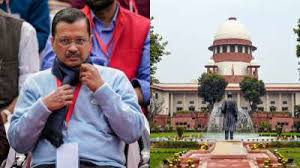NEW DELHI: The Supreme Court will on Monday take up Delhi Chief Minister Arvind Kejriwal’s petition challenging the Delhi High Court’s verdict upholding his arrest by the Enforcement Directorate in a money laundering case linked to the Delhi excise policy case.
Kejriwal’s petition is listed before a Bench of Justice Sanjiv Khanna and Justice Dipankar Datta for hearing on April 15. A day after the Delhi High Court dismissed his petition against his arrest by the ED, Kejriwal had on April 10 moved the SC challenging the high court’s verdict.
A Bench led by CJI DY Chandrachud had on April 10 agreed to consider Kejriwal’s request for an urgent hearing of his petition after senior counsel AM Singhvi mentioned his petition for immediate listing. Singhvi had said the high court’s order was based on certain material that was suppressed from the petitioner.
The ED had arrested Kejriwal on March 21 after the Delhi High Court refused to grant him protection from coercive action by the probe agency in the money laundering case.
On April 1, a Delhi special court sent Kejriwal to 14-day judicial custody till April 15 on the expiry of his ED custody. The ED alleged that Kejriwal was the kingpin and key conspirator of the excise “scam” and there were reasons to believe on the basis of material in its possession that the AAP leader was guilty of the offence of money laundering. Spelling further trouble for the beleaguered Delhi CM, Justice Swarana Kanta Sharma of the Delhi High Court had on April 9 dismissed his petition challenging his arrest by the ED, saying there was no violation of law or the Supreme Court’s verdicts.
Justice Sharma held that Kejriwal’s arrest by the ED and his subsequent remand in the Enforcement Directorate’s custody and later in judicial custody could not be held to be illegal as the probe agency was in possession of “enough material” that led to his arrest, and the trial court remanded him in the custody of the agency by a well-reasoned order.
“The material collected by the ED reveals that Kejriwal conspired and was involved in the formulation of the excise policy and used the proceeds of the crime. He is also allegedly involved in his personal capacity in the formulation of the policy and demanding kickbacks in the capacity of national convener of AAP,” the HC had said.


